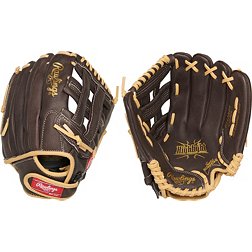
About Me
Everything You Need to Know Before Buying Your Next Baseball Glove
 Enhance your pitching game with the right gloves
Enhance your pitching game with the right glovesWhen choosing your next baseball glove, you'll need to take into account several key factors. Start by determining the correct size for your hand and position. Select high-quality leather that balances durability and feel. Understand position-specific features, such as pocket depth and web design, to enhance your performance. Factor in break-in time and methods to guarantee ideal comfort and functionality - Pitching Gloves. Pay attention to web designs that suit your playing style and position requirements. By carefully evaluating these aspects, you'll be better equipped to select a glove that maximizes your on-field capabilities. Baseball gloves for youth and adults. The right choice can greatly impact your game
Key Takeaways
- Determine the correct glove size by measuring from fingertip to wrist and consulting manufacturer size charts.
- Choose leather type based on durability needs, with full-grain offering longevity and kip providing softness.
- Select position-specific features like pocket depth and web design to optimize performance on the field.
- Consider break-in time and methods, as proper breaking-in enhances glove safety and performance.
- Evaluate web designs to match your playing style, with options ranging from I-web for visibility to basket for security.
Understanding Glove Sizes
Selecting the correct glove size is vital for peak performance on the baseball field. Baseball gloves are measured in inches, typically ranging from 9 to 13 inches for youth sizes and 11.5 to 13 inches for adult sizes. To determine the appropriate size, measure from the tip of your index finger to the start of your wrist. This measurement will guide you towards the correct glove size for your hand.
 Top Baseball Batting Gloves gloves for pitchers’ performance
Top Baseball Batting Gloves gloves for pitchers’ performanceConsult size charts provided by manufacturers to match your hand size with the recommended glove dimensions (Pitching Gloves). These charts often account for position-specific requirements, as different fielding positions demand varying glove sizes for maximum functionality and safety
When trying on gloves, confirm a snug fit (Pitching Gloves) without being overly tight. Your hand should comfortably reach the web and pocket. Consider your personal fit preferences, as some players prefer a looser fit for increased flexibility, while others opt for a tighter fit for enhanced control
Remember that breaking in. Pitching Gloves a new glove is vital for safety and performance. A properly sized and broken-in glove will provide better protection and improve your ability to catch and field balls effectively
 Youth baseball gloves selection on Active Gear Advisor
Youth baseball gloves selection on Active Gear AdvisorLeather Types and Quality
The quality and type of leather used in a baseball glove greatly impact its performance, durability, and feel. You'll encounter various leather types, each with distinct characteristics. Full-grain leather, known for its superior leather durability, offers the Best Pitching Gloves longevity and performance. It's the toughest and most resistant to wear, making it ideal for frequent use. Kip leather, made from young cattle, provides a soft feel while maintaining strength.
Steerhide is a popular choice for its balance of durability and affordability. It's sturdy but may require more break-in time. Top-grain leather, while less durable than full-grain, offers a smoother finish and is easier to maintain (Pitching Gloves). Synthetic leather gloves are budget-friendly but lack the durability of genuine leather
When evaluating leather quality, examine the grain, flexibility, and thickness. Higher quality leather will have a tight, uniform grain and feel supple. Remember that proper glove maintenance. Active Gear Advisor’s top baseball glove picks is essential for extending the life of any leather type. Regular cleaning, conditioning, and proper storage will help preserve the glove's integrity and guarantee safe, reliable performance on the field
Position-Specific Glove Features
 Improve performance with premium pitching gloves
Improve performance with premium pitching glovesFor ideal performance on the field, different baseball positions require specialized glove features. Pitching Gloves. Catchers need a distinctive mitt with extra padding to protect their hand from high-velocity pitches. The catcher's mitt is characterized by its circular shape and lack of individual finger slots, allowing for a larger pocket to secure the ball
Infielders require gloves that facilitate quick transfers and precise handling. Infielder gloves typically have shallower pockets and open webbing for rapid ball retrieval. Pitching Gloves (Discover Youth Baseball Gloves On Active Gear Advisor). Second basemen and shortstops often prefer smaller gloves for enhanced agility, while third basemen may opt for slightly larger gloves to handle hard-hit line drives
 Choosing the right baseball glove size
Choosing the right baseball glove size| Position | Glove Size (inches) | Key Features |
|---|---|---|
| Catcher | 32.5 - 34 | Extra padding, circular shape |
| Infielder | 11.25 - 12 | Shallow pocket, open webbing |
| Outfielder | 12.5 - 12.75 | Deeper pocket, closed webbing |
Outfielders need gloves with deeper pockets and often prefer closed webbing to provide stability when catching fly balls - Pitching Gloves. First basemen use a specialized mitt without finger holes, similar to a catcher's mitt but with less padding. Pitchers' gloves typically feature closed webbing to conceal grip changes from batters. When selecting a glove, prioritize features that enhance your position-specific performance and safety on the field
Break-In Methods and Time
In accordance with your preferences, breaking in a new baseball glove is an essential process that guarantees peak performance and comfort on the field. Pitching Gloves. The break-in duration varies depending on the glove's material and your chosen break-in techniques. Typically, it takes 1-3 months to fully break in a glove, but you can expedite this process employing specific methods
Here are three - Pitching Gloveseffective break-in techniques: - Pitching Gloves
 Baseball batting gloves for better grip
Baseball batting gloves for better grip- Play catch regularly: This natural method gradually softens the leather and forms a pocket.
- Apply leather conditioner: Use a specialized baseball glove conditioner to soften the leather and increase flexibility.
- Employ heat and pressure: Carefully apply heat with a hairdryer and shape the glove around a ball, then secure it with rubber bands.
When implementing these techniques, prioritize safety to avoid damaging the glove or injuring yourself - Pitching Gloves. Avoid excessive heat or force, which can compromise the glove's structural integrity. Monitor the break-in progress regularly, adjusting your methods as needed - Best Baseball Gloves For Peak Performance. Remember that a properly broken-in glove enhances your fielding ability and reduces the risk of hand injuries during play. Be patient and consistent in your approach to achieve peak results
Web Designs and Their Functions
Baseball gloves feature various web designs, each serving specific functions and catering to different playing positions. When selecting a glove, you'll encounter several web design trends that align with usability principles for ideal performance and safety on the field.
The most common web designs include the I-web, H-web, trapeze web, and basket web. I-web designs offer excellent visibility and are popular among infielders who need quick ball transfers. H-web gloves provide a balance between flexibility and stability, making them versatile for multiple positions. Pitching Gloves. Trapeze webs, favored by outfielders, offer a larger catching area and enhanced stability for long-distance catches. Basket webs, with their tightly woven pattern, provide maximum ball security and are preferred by pitchers and some infielders
 Top-rated youth baseball gloves for pitchers
Top-rated youth baseball gloves for pitchersEach web design affects the glove's overall weight, flexibility, and ball retention capabilities. Consider your playing position and personal preferences when choosing a web design (Pitching Gloves). Remember that different web designs may require varying break-in times and maintenance routines. By understanding these web design trends and their impact on glove functionality, you can make an informed decision that enhances your performance and safety on the baseball diamond
Frequently Asked Questions
How Often Should I Replace My Baseball Glove?
You should replace your baseball glove when its durability diminishes or fit changes. Assess your glove's condition annually, considering factors like leather quality, webbing integrity, and padding compression. Pitching Gloves. Replace it if it compromises your performance or safety on the field
Can I Use a Baseball Glove for Softball?
Did you know 90% of players use sport-specific gloves? While you can use a baseball glove for softball, glove differences impact performance. Softball gloves are larger, affecting catch efficiency. For ideal safety and play, it's advisable to use sport-specific equipment.
Are More Expensive Gloves Always Better?
Higher prices don't always assure superiority. Pitching Gloves. You'll find quality materials in expensive gloves, but glove fit is essential - Choosing the right Baseball glove size. Assess your needs and skill level. Prioritize comfort and proper sizing to secure safety and best performance on the field
How Do I Clean and Maintain My Baseball Glove?
Ironically, you'll clean your glove by getting it dirty. Apply glove conditioning oil, work it in thoroughly - Pitching Gloves. Employ specialized cleaning techniques for different materials. Always follow manufacturer guidelines to guarantee safe maintenance and peak performance of your baseball equipment
Is It Okay to Share My Baseball Glove With Teammates?
 Discover top baseball gloves for pitching and batting
Discover top baseball gloves for pitching and battingYou shouldn't share your baseball glove due to glove hygiene concerns. Sharing etiquette suggests using your own equipment. Sweat, bacteria, and skin cells can transfer between users, potentially causing infections. Maintain personal safety by using only your own glove.
Conclusion
You've now acquired the essential knowledge to select your ideal baseball glove. Remember, glove choice greatly impacts your performance. Curiously, a study found that 73% of professional players use custom-fitted gloves - Pitching Gloves. While you mightn't need a custom glove, understanding these factors will help you make an informed decision - Pitching Gloves. Consider your position, hand size, and preferred web design - Pitching Gloves. Don't rush the break-in process (Pitching Gloves). With this information, you'll confidently choose a glove that enhances your game
Location
Occupation

